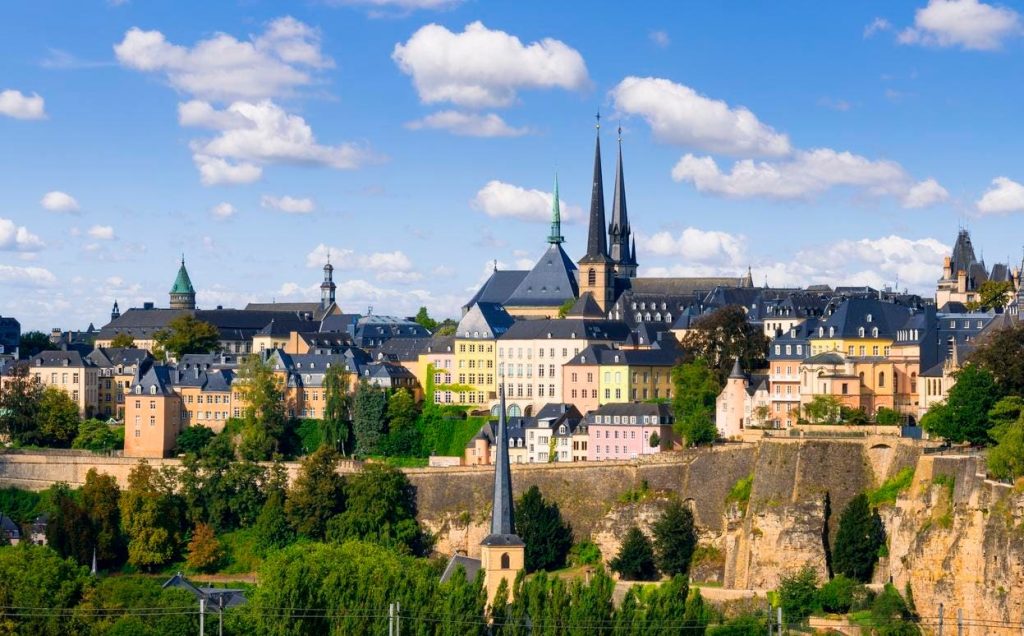View of Luxembourg City’s Old Town
getty
Luxembourg has been listed as the world’s most liveable city in the annual Mapping the World’s Prices – 2025 report ranking the cheapest and most expensive cities by the Deutsche Bank Research Institute assessing global cost and quality-of-life indicators.
The newly-released report, now in its ninth edition, tracks cost-of-living from rental prices to many goods and services including phones, coffee, beer, taxis, cinema tickets, denim and more in 69 cities relevant to financial markets, ranging from Abu Dhabi to Zurich.
“We have a surprise #1 in the quality-of-life stakes,” the report teases. “A clue would be that this country is 90 spots lower in the FIFA football rankings.”
With its mix of high incomes, free public transport and overall quality of life – the capital of the Grand Duchy of Luxembourg has surpassed wealthier cities like Zurich and Geneva.
“The breakdown of the quality-of-life index shows Luxembourg scoring strongly in purchasing power (6th), commute times (5th), and pollution levels (4th),” RTL Today reports. “Utilities are not listed among the most expensive globally, suggesting that monthly costs for essentials like energy and water remain comparatively moderate.”
Although, according to the report, mortgage payments in Luxembourg are relatively low as a percentage of household income, placing it alongside more affordable cities like Brussels and Chicago, “that may come as a surprise to many residents,” the publication explains. “Earlier this month, the June edition of the Politmonitor confirmed that housing remains the top concern among Luxembourg voters.”
The Five Top For Life Quality
Scenic view of Copenhagen’s Nyhavn harbor
getty
Following Luxembourg, the five top cities for best quality of life are Copenhagen, Amsterdam, Vienna and Helsinki. Because their cost of living is now the highest in the world, Zurich and Geneva have slipped out of the top five.
With Geneva, Zurich, San Francisco and Boston, Luxembourg also ranks the highest for salaries after taxes, at $6,156, marking a 39% increase over the past five years and is the best performer in terms of quality of life next to Copenhagen and Amsterdam.
Luxembourg’s purchasing power has risen significantly since 2000, climbing 14 places globally, and its average inflation rate of 3.4% since 1971 is among the lowest worldwide.
Other financial hubs such as Tokyo in 26th place, Paris 44th, Hong Kong 48th, London and New York tied at 50th, all scored lower on quality of life, hampered by expensive housing, long commutes and high levels of pollution.
Some Ranking Surprises
People and cars speed through Times Square in New York
getty
Another ‘surprise’ in the study is this: U.S. cities that “rarely cracked the global top 10 for prices or pay are now jostling with Geneva and Zurich for the top in many of the charts.”
New York is the priciest place to live in the city’s center, with rent for a three-bedroom apartment costing an average $8,500 a month in 2025. The other American cities that appear among the 11 top ranking for high rents and groceries are Boston, San Francisco, Chicago and Los Angeles.
A strong dollar, Wall Street strength and a tech sector that has gone global and remains American-led are among the reasons mentioned in the report that also advises that the trend may be reaching its peak “at least in pricing terms.”
A third ‘surprise’ in the report is how cheap fast-growing India remains versus its international peers, and predicts that “it will largely be the third-largest economy in the world by the end of the decade.”
Some Lighter Indicators
The Mapping the World Prices report also includes lighter touches as it spotlights the cost of some daily indulgences as indicators – for example, the price of a cappucino being most expensive in Zurich, while the most expensive glass of wine is in Singapore.
The least expensive location to buy a new iPhone? Seoul, Korea. The best place for a cheap date? Bangalore, India.
Luxembourg, however, doesn’t shine regarding one of the indicators: It’s the third-most expensive place in the world for a five-kilometer taxi ride, behind only Zurich and Paris.
Long Term Shifts By Country
Looking at longer-term shifts in relative prices levels across countries’ economies, the report notes that in 2000 the U.S. was second to Japan in terms of purchasing power parity (PPP). Since then, Japan has dropped 23 places, paying the price for excesses that peaked in the 1990s.
Meanwhile, New Zealand rose 20 places, Luxembourg 14 places, Australia 14, Saudi Arabia 12, Czech Republic 11 and the UAE 11, moving up notably in the ranking.
The U.S. declined 16 places between 2000 and 2010 to bounce back to #3 behind Switzerland and Israel by the start of 2025.
The complete Deutsche Bank Research Institute report Mapping The World’s Prices with commentaries and charts of the Cheapest and Most Expensive Cities can be found here.
MORE FROM FORBES


